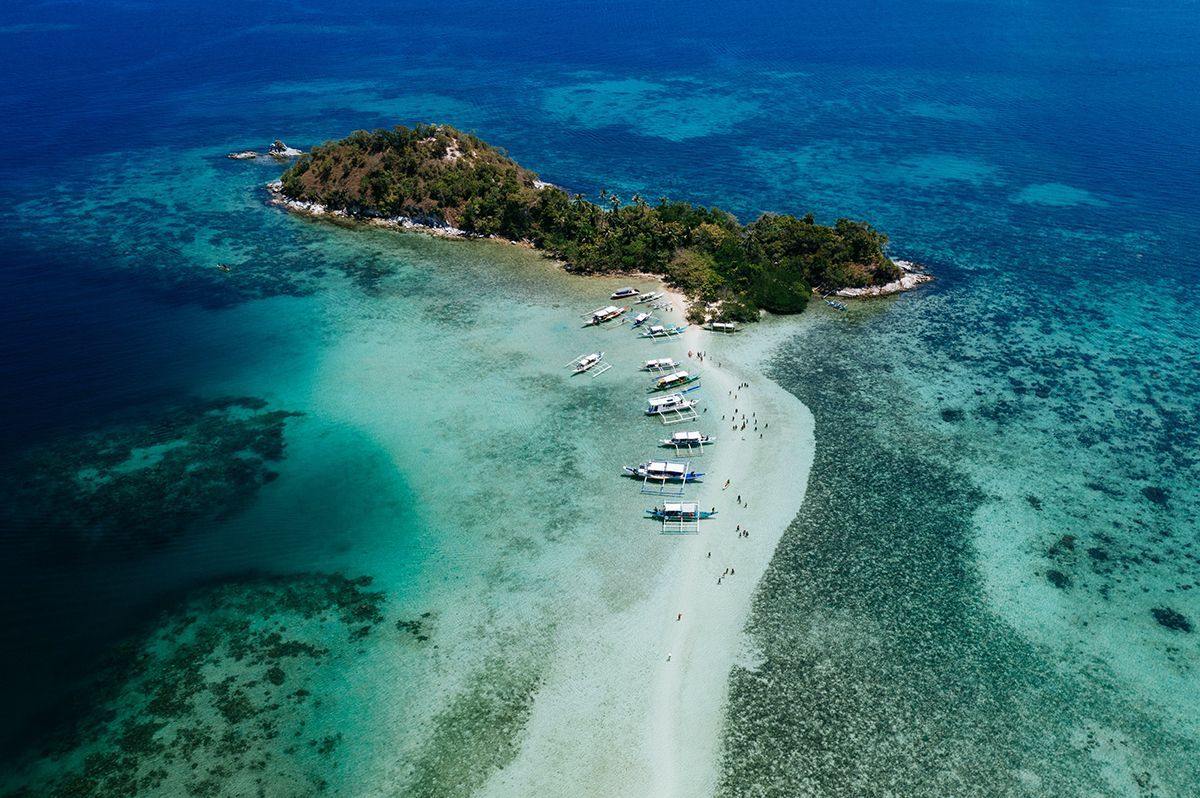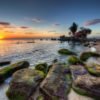Some Interesting facts about Island Countries

There are 195 countries in the world. Forty-six of them are island countries. They are located in different corners and all the oceans of the world. Some countries are located on a single island, like Barbados or Nauru, while others spread out over an entire archipelago (Indonesia, the Philippines). In this article, we will tell you about the smallest and largest island states, as well as general information about the islands that are countries.
Features of the island countries
These are the countries located on an island or several islands or land surrounded by water. Such areas often have a unique ecosystem, a large number of endemics, and original culture. This is because isolation directly impacts the flora and fauna and the worldview of the population. The main food resources of such countries are seafood and products from plantations for export.
The economy in island countries is very vulnerable to world changes due to their dependence on exports and the high cost of transportation. However, this does not mean that all island countries are poor. One should understand that they are very different. Some of the island countries are leaders in the economic development of the world!
Another feature of island countries is the small population. However, it is also a trend, not a rule. We will talk more about this in the part about the largest and smallest island countries in the world.
List Of Island Countries
The island countries are located in every part of the world and almost every continent except South America. Here is a list of the world’s island countries. The list includes UN member states, including the Federated States, as well as states with limited recognition. All names are listed in alphabetical order.
| Country | Capital | Official language | Ethnic groups | Religion | Government | Area. Total/Water | Population/Density | GDP (PPP)/Per capita | GDP (nominal)/Per capita | Currency | Time zone | Driving side |
|---|---|---|---|---|---|---|---|---|---|---|---|---|
| 🇦🇬 Antigua and Barbuda | St. John’s | None (no legislation mentions an official language) (Vernacular -Antiguan and Barbudan, Working – English) | 87.27% African (Black), 4.73% Multiracial, 1.65% European (White), 6.35% Other | 76.5% Christianity, 12.1% Other, 5.9% No religion, 5.5% Unspecified | Unitary parliamentary constitutional monarchy | 440 km2 | 99,337 / 186/km2 | $2.731 billion / $29,298 | $1.717 billion / $18,416 | East Caribbean dollar (XCD) | UTC-4 (AST) | left |
| 🇧🇸 The Bahamas | Nassau | English | 90.6% Black, 4.7% White,2.1% Mixed,1.9% Others, 0.7% Unspecified | 95.8% Christianity: 80.0% Protestantism, 15.8% Other Christian; 3.1% No religion; 1.1% Others | Unitary parliamentary constitutional monarchy | 13,878 km2 / 28% | 400,516 / 25.21/km2 | $12.612 billion / $33,494 | $12.803 billion / $34,102 | Bahamian dollar (BSD) | UTC−5 (EST). Summer (DST) – UTC−4 (EDT) | left |
| 🇧🇭 Bahrain | Manama | Arabic | 53.2% Arabs: 47.4% Bahrainis, 5.8% other Arabs; 43.4% Asians; 1.4% Africans; 1.1% North Americans; 0.8% Europeans; 0.1% Others | 69.7% Islam (official), 14.1% Christianity, 10.2% Hinduism, 3.1% Buddhism, 2.0% No religion, 0.9% Others | Unitary parliamentary semi-constitutional monarchy | 785.08km2 | 1,569,446 / 1,912.7/km2 | $78.760 billion / $52,129 | $41.607 billion / $27,538 | Bahraini dinar (BHD) | UTC+3 (AST) | right |
| 🇧🇧 Barbados | Bridgetown | English | 92.4% Black, 3.1% Multiracial, 2.7% White, 1.3% Indian, 0.3% Others/Unspecified | 75.6% Christianity, 20.6% No religion, 2.5% Others, 1.3% Unspecified | Unitary parliamentary republic | 439 km2 | 287,025 / 660/km2 | $5.398 billion / $18,798 | $5.207 billion / $18,133 | Barbadian dollar ($) | UTC−4 (AST) | left |
| 🇧🇳 Brunei Darussalam | Bandar Seri Begawan | Malay | 65.7% Malays, 10.3% Chinese, 24% others | 80.9% Sunni Islam (official), 7.1% Christianity, 7% Buddhist, 5% other (includes indigenous beliefs) | Unitary Islamic absolute monarchy | 5,765 km2 / 8.6% | 460,345 / 72.11/km2 | $33.389 billion / $74,952 | $35.555 billion / $79,816 | Brunei dollar (BND) | UTC+8 (Brunei Darussalam Time) | left |
| 🇨🇻 Cape Verde | Praia | Portuguese | 71% Creole or Mulatto, 28% African; 1%Portuguese or other European. | 85.3% Christianity: 77.3% Catholicism, 8.0% Other Christian; 10.8% No religion; 3.9% Others | Unitary semi-presidential republic | 4,033 km2 | 483,628 / 123.7/km2 | $4.323 billion / $7,728 | $2.042 billion / $3,651 | Cape Verdean escudo (CVE) | UTC–1 (CVT), Summer (DST), UTC–1 (not observed) | right |
| 🇰🇲 Comoros | Moroni | Comorian, French, Arabic | Afro-Arab 86%, Malagasy 14% | 98% Islam, 2% Christianity | Federal presidential republic | 1,861 km2 | 850,886 / 457/km2 | $2.446 billion / $2,799 | $1.179 billion / $1,349 | Comorian franc (KMF) | UTC+3 (EAT) | right |
| 🇨🇺 Cuba | Havana | Spanish | 64.1% White, 26.6% Mixed, 9.3% Black | 58.9% Christianity, 23.2% No religion, 17.6% Folk religions, 0.3% Others | Unitary Marxist–Leninist one-party socialist republic | 109,884 km2 | 11,181,595 / 101.8/km2 | US$254.865 billion / US$22,237 | US$107.352 billion / US$9,478 | Cuban peso | UTC−5 (CST), Summer (DST), UTC−4 (CDT) | right |
| 🇨🇾 Cyprus | Nicosia | Greek, Turkish | Greek Cypriots, Turkish Cypriots, Armenian Cypriots, Maronite Cypriots | 72.3% Christianity, 25.0% Islam, 1.9% No religion, 0.8% Other | Unitary presidential republic | 9,251 km2 / 0.11% | 1,189,265 / 123.4/km2 | $43.802 billion / $48,443 | $27.726 billion / $30,663 | Euro (€) (EUR) | UTC+2 (EET), Summer (DST) UTC+3 (EEST) | left |
| 🇩🇲 Dominica | Roseau | English | 86.6% African, 9.1% Multiracial, 2.9% Kalinago, 1.3% European or Other, 0.2% Unspecified | 94.4% Christianity, 3.0% Folk religions, 1.7% Other, 0.9% None | Unitary parliamentary republic | 750 km2 / 1.6% | 71,625 / 105/km2 | $688 million / $9,726 | $485 million / $7,860 | East Caribbean dollar (XCD) | UTC–4 (AST) | left |
| 🇩🇴 Dominican Republic | Santo Domingo | Spanish | 70.4% Mixed, 58.0% Mestizo/indio[a], 2.4%, Mulatto; 15.8% Black, 13.5% , White, 0.3% Other | 66.7% Christianity: 44.3% Roman Catholic, 21.3% Protestant, 1.1% Other Christian; 29.6% No religion, 0.7% Other , 2.0% Unspecified | Unitary presidential republic | 48,671 km2 / 0.7% | 10,878,246 / 220/km2 | $215.999 billion / $20,625 | $96.291 billion / $9,195 | Dominican peso | UTC – 4:00 (Atlantic Standard Time) | right |
| 🇫🇯 Fiji | Suva | Fijian, English, Fiji Hindi | 56.8% Indigenous Fijians, 37.5% Indo-Fijians, 1.2% Rotumans, 4.5% Others | 64.4% Christianity – 34.6% Methodism, 29.8% Other Christian; 27.9% Hinduism; 6.3% Islam; 1.4% Others / None | Unitary parliamentary republic | 18,274 km2 | 926,276 / 46.4/km2 | $9.112 billion / $10,251 | $5.223 billion / $5,876 | Fijian dollar (FJD) | UTC+12 (FJT), Summer (DST) UTC+13 (FJST) | left |
| 🇬🇩 Grenada | St. George’s | English | 82.4% African descent, 13.3% Mixed, 2.2% East Indian, 1.3% Other, 0.9% Unspecified | 86.4% Christianity: 49.2% Protestantism, 37.2% Other Christian; 5.7% None; 1.2% Rastafari; 5.4% Others; 1.3% Unspecified. | Unitary parliamentary constitutional monarchy | 348.5 km2 / 1.6% | 111,454 / 318.58/km2 | $1.801 billion / $16,604 | $1.249 billion / $11,518 | East Caribbean dollar (XCD) | UTC−4 (AST) | left |
| 🇭🇹 Haiti | Port-au-Prince | French, Haitian Creole | 95% Afro-Haitians, 5% mixed and European Haitians | 86.9% Christianity, 10.6% No religion, 2.2% Folk religions, 0.3% Others | Unitary semi-presidential republic | 27,750 km2 / 0.7% | 11,439,646 / 382/km2 | $34.189 billion / $2,962 | $22.431 billion / $1,943 | Gourde (G) (HTG) | UTC−5 (EST) , Summer (DST) – UTC−4 (EDT) | right |
| 🇮🇸 Iceland | Reykjavík | Icelandic | 89% Icelandic, 5% Polish, 1% Lithuanians, 5% Others | 75.1% Christianity: 63.5% Church of Iceland, 1.6% Other Christian; 21.5% No religion; 1.3% Ásatrúarfélagið; 2.1% Others | Unitary parliamentary republic | 102,775 / 2.07% | 371,580 / 3.5/km2 | $19.8 billion / $54,482 | $20.8 billion / $57,189 | Icelandic króna (ISK) | UTC[c] (GMT/WET) | right |
| 🇮🇩 Indonesia | Jakarta | Indonesian | Over 1,300 ethnic groups | 86.70% Islam; 10.72% Christianity; 1.74% Hinduism; 0.77% Buddhism; 0.04% Folk/Other; 0.03% Confucianism | Unitary presidential republic | 1,904,569km2 / 4.85% | 273.879.750 / 141/km2 | US$3,995 trillion / US$14,535 | US$1,289 trillion / US$4,691 | Indonesian rupiah (Rp) (IDR) | UTC+7 to +9 (various) | left |
| 🇮🇪 Ireland | Dublin | English, Irish, ISL, Ulster Scots, NISL, Shelta | 96.4% White, 1.7% Asian, 1.1% Black 0.8% Other | Catholic Church (40.8%), Presbyterian Church in Ireland (19.1%), Church of Ireland (13.7%), Methodist Church in Ireland (3.0%), Other Christian (5.8%), Other religion (0.8%), Non-religious (10.1%), Not stated (6.8%) | Unitary parliamentary democratic Republic | 84,421 km2 | 6,572,728 , 77.8/km2 | $500 billion / $99,239 | $476 billion / $94,556 | Euro (€; EUR) | Irish Standard Time / British Summer Time (UTC+1) Greenwich Mean Time (UTC) | left |
| 🇯🇲 Jamaica | Kingston | English | 92.1% Afro-Jamaicans (incl. 25% mixed Irish Jamaican), 3.8% Chinese, 3.3% Mixed, 0.8% Other | 68.9% Christianity: 64.8% Protestantism , 4.1% other Christian; 21.3% No religion; 1.1% Rastafarianism; 6.5% Others; 2.3% Not stated | Unitary parliamentary constitutional monarchy | 10,991 km2 / 1.5% | 2,726,667 / 266 | $26.981 billion / $9,434 | $15.424 billion / $5,393 | Jamaican dollar (JMD) | UTC-5 | left |
| 🇯🇵 Japan | Tokyo | Japanese | Japanese 98.1%, Chinese 0.5%, Korean 0.4%, other 1% (includes Filipino, Vietnamese, and Brazilian) | Irreligion (62%), Buddhism (31%), Shintoism (3%), Christianity (1%), Others (1%), No answer (2%) | Unitary parliamentary constitutional monarchy | 377,975 km2 / 1.4% | 125,502,000 / 332/km2 | $6.110 trillion / $6.110 trillion | $4.912 trillion / $39,243 | Japanese yen (¥) | UTC+09:00 (JST) | left |
| 🇰🇮 Kiribati | South Tarawa on Tarawa | English, Gilbertese | 96.8% Gilbertese, 3.2% Others | 96.2% Christianity, 2.1% Baháʼí Faith, 0.5% None, 1.2% Others | Unitary parliamentary republic with an executive presidency | 811 km2 | 119,940 / 151.9/km2 | $255 million / $2,135 | $187 million / $1,599 | Australian dollar | UTC+12, +13, +14 | left |
| 🇲🇬Madagascar | Antananarivo | Malagasy, French | 26% Merina, 15% Betsimisaraka, 12% Betsileo, 7% Tsimihety, 6% Sakalava, 5% Antaisaka, 5% Antandroy, 24% Others | 85.3% Christianity: 45.8% Protestantism, 38.1% Catholicism, 1.4% Other Christian; 6.9% No religion; 4.5% Traditional faiths; 3.0% Islam; 0.3% Others | Unitary semi-presidential republic | 587,041 km2 / 5,501 km2 (0.9%) | 28,427,328 / 35.2/km2 | $45.948 billion / $1,697 | $12.734 billion / $471 | Ariary (MGA) | UTC+3 (EAT), Summer (DST) – UTC+3 (not observed) | right |
| 🇲🇻 Maldives | Malé | Dhivehi | 100% Maldivians | Sunni Islam (official) | Unitary presidential constitutional republic | 300 km2 | 579,330 / 1,102.5/km2 | $11.385 billion / $29,132 | $5,502 billion / $14,078 | Maldivian rufiyaa (MVR), United States dollar (USD, used in Maldivian resort islands) | UTC+5 (Maldives Time) | left |
| 🇲🇹 Malta | Valletta | Maltese, English | 80.0% Maltese, 20.0% Non-Maltese | 90% Christianity: 83% Roman Catholic, 7% Other Christian; 5% No religion; 2% Islam; 3% Others | Unitary parliamentary republic | 316 km2 / 0.001% | 516,100 / 1,633/km2 | $22.802 / $48,246 | $15.134 / $32,021 | Euro (€) (EUR) | UTC+1 (Central European Time) / (DST) UTC+2 (Central European Summer Time) | left |
| 🇲🇭 Marshall Islands | Majuro | Marshallese, English | 92.1% Marshallese, 5.9% Mixed Marshallese, 2% Others | 97% Christianity, 2% None, 1% Others | Unitary parliamentary republic with an executive presidency | 181.43 km2 | 58,413 / 293.0/km2 | $215 million / $3,789 | $220 million / $3,866 | United States dollar (USD) | UTC+12 (MHT) | right |
| 🇲🇺Mauritius | Port Louis | None (de jure), English (de facto), French (de facto) | 67% Indo-Mauritians; 28% Mauritian Creoles; 3% Sino-Mauritians; 2% Franco-Mauritians | 48.54% Hinduism, 32.71% Christianity, 17.30% Islam, 1.45% Others / None | Unitary parliamentary republic | 2,040 km2 / 0.07% | 1,265,475 / 618.24/km2 | $31.705 billion / $25,029 | $14.812 billion / $11,693 | Mauritian rupee (MUR) | UTC+4 (MUT) | left |
| 🇫🇲Micronesia | Palikir | English | 48.8% Chuukese, 24.2% Pohnpeian, 6.2% Kosraean, 5.2% Yapese, 4.5% Outer Yapese, 1.8% Asian, 1.5% Polynesian, 6.4% Other, 1.4% Unknown | 95.3% Christianity: 52.6% Roman Catholic, 41.7% Protestant, 1.0% Other Christian; 4.1% Folk religions; 0.6% None / Others | Federal assembly-independent republic under a non-partisan democracy | 702 km2 | 104,468 / 58.1/km2 | $367 million / $3,584 | $383 million / $3,735 | United States dollar (USD) | UTC+10 and +11 | right |
| 🇳🇷 Nauru | Yaren (de facto) | Nauruan, English | Nauruans (93.6%), while minorities include I-Kiribati (1.8%), Chinese (1.5%) and others (3.1%) | Nauru Congregational Church (35.71%), Roman Catholic (32.96%), Assemblies of God (12.98%), Nauru Independent Church (9.50%), Baptist (1.48%), Other (mostly Chinese folk religion) or not stated (7.34%) | Unitary parliamentary republic with an executive presidency under a non-partisan democracy | 21 km2 / 0.57% | 10,834 / 480/km2 | $132 million / $9,995 | $133 million / $10,125 | Australian dollar (AUD) | UTC+12 | left |
| 🇳🇿 New Zealand | Wellington | English, Māori, NZ Sign Language | 71.8% European, 16.5% Māori, 15.3% Asian,n9.0% Pacific peoples, 1.5% ME/LA/African, 1.2% Others | 48.5% No religion, 37.0% Christianity, 2.6% Hinduism, 1.3% Islam, 1.1% Buddhism, 1.9% Others, 6.6% No answer | Unitary parliamentary constitutional monarchy | 268,021 km2 / 1.6% | 5,137,520 / 19.1/km2 | $226.566 billion / $44,226 | $243.332 billion / $47,499 | New Zealand dollar ($) (NZD) | UTC+12 (NZST) / (DST) UTC+13 (NZDT | left |
| 🇵🇼 Palau | Ngerulmud | Palauan, English | 73% Palauan, 21.7% Asian, 2% Carolinian, 1.2% European, 2.1% Other | 89.7% Christianity, 5.7% Modekngei, 3.0% Islam, 2.6% Other / None | Unitary presidential republic under a non-partisan democracy | 459 km2 | 18,233 / 46.7/km2 | $300 million / $16,296 | $322 million / $17,438 | United States dollar (USD) | UTC+9 (PWT) | right |
| 🇵🇬 Papua New Guinea | Port Moresby | English, Hiri Motu, PNG Sign Language, Tok Pisin | Papuan | 95.5% Christianity: 64.3% Protestantism, 26.0% Catholicism, 5.2% Other Christian; 3.1% Unspecified; 1.4% Others / None | Unitary parliamentary constitutional monarchy | 462,840 km2 / 2% | 8,935,000 / 15/km2 | $32.382 billion / $3,764 | $21.543 billion / $2,504 | Kina (PGK) | UTC+10, +11 (AEST) | left |
| 🇵🇭Philippines | Manila (de jure) | Filipino, English | 33.7% Visayan, 24.4% Tagalog, 8.4% Ilocano, 6.8% Bicolano, 26.2% Others | 88.7% Christianity: 79.6% Roman Catholic, 9.1% Other Christian; 6.0% Islam; 5.3% Other / None | Unitary presidential republic | 300,000 km2 / 0.2% | 109,991,095 / 336/km2 | $1.0 trillion / $9,061 | $402.638 billion / $3,646 | Philippine peso (₱) (PHP) | UTC+08:00 (PST) | right |
| 🇱🇨 Saint Lucia | Castries | English | 85.3% Black (African), 10.9% Mixed, 2.2% Indian, 1.6% Other/Unspecified | 90.4% Christianity, 5.9% No religion, 1.9% Rastafari, 1.8% Other/Unspecified | Unitary parliamentary constitutional monarchy | 617 km2 / 1.6% | 184,961 / 299.4/km2 | $2.480 billion / $13,708 | $1.77 billion / $9,780 | East Caribbean dollar (XCD) | UTC−4 (AST) | left |
| 🇻🇨 Saint Vincent and the Grenadines | Kingstown | English | 66% Black (African), 19% Mixed, 6% Indian, 4% European, 2% Kalinago, 3% Others | 82.1% Christianity, 7.5% No religion, 1.1% Rastafari, 4.6% Others, 4.7% Unspecified | Unitary parliamentary constitutional monarchy | 389 km2 | 100,455 / 307/km2 | $1.373 billion / $12,431 | $864 million / $7,827 | East Caribbean dollar (XCD) | UTC-4 (AST) | left |
| 🇦🇸 Apia | Apia | Samoan, English | 92.6% Samoans, 7.0% Euronesians, 0.4% Europeans, 0.1% East Asian | Christianity (official) | Unitary parliamentary republic | 2,842 km2 / 0.3% | 202,506 / 70/km2 | $1.188 billion / $5,962 | $881 million/ $4,420 | Tālā (WS$b) (WST) | UTC+13c (WST) | left |
| 🇸🇹 São Tomé and Príncipe | São Tomé | Portuguese | Mixed African, Portuguese-African | 81.1% Christianity, 13.2% No religion, 3.1% Folk religions, 2.4% Others | Unitary semi-presidential republic | 1,001 km2 | 211,028 / 199.7/km2 | $685 million / $3,220 | $355 million / $1,668 | Dobra (STN) | UTC (GMT) | right |
| 🇸🇨Seychelles | Victoria | English, French, Seychellois | 93% Seychellois Creoles, 3.0% British, 1.8% French, 0.5% Chinese, 0.3% Indian, 1.2% others | 89.2% Christianity: 76.2% Catholicism, 6.1% Anglicanism, 6.9% Other Christian; 2.4% Hinduism; 1.6% Islam; 1.1% Others; 0.9% None; 4.8% Undeclared | Unitary presidential republic | 459 km2 | 99,331/ 214.5/km2 | $3.503 billion / $35,272 | $1.757 billion / $17,693 | Seychellois rupee (SCR) | UTC+4 (SCT) | left |
| 🇸🇬Singapore | Singapore | English, Malay, Mandarin, Tamil | 62.0% Singapore Citizen: 75.9% Chinese, 15.0% Malay, 7.5% Indian, 1.6% Others; 9.2% Permanent Resident; 28.9% Others | 31.1% Buddhism, 20.0% No religion, 18.9% Christianity, 15.6% Islam, 8.8% Taoism, 5.0% Hinduism, 0.6% Others | Unitary dominant-party parliamentary republic | 733.1 km2 | 5,453,600 / 7,804/km2 | $600.063 billion / $102,742 | $374.394 billion / $64,103 | Singapore dollar (S$) (SGD) | UTC+8 (Singapore Standard Time) | left |
| 🇸🇧 Solomon Islands | Honiara | English | 95.3% Melanesian, 3.1% Polynesian, 1.2% Micronesian, 0.4% Others | 97.4% Christianity: 76.6% Protestantism, 19.0% Catholicism, 1.8% Other Christian; 1.2% Folk religions; 1.4% Others / None | Unitary parliamentary constitutional monarchy | 28,400 km2 / 3.2% | 652,857 / 18.1/km2 | $1.479 billion / $2,307 | $1.511 billion / $2,357 | Solomon Islands dollar (SBD) | UTC+11 | left |
| 🇱🇰 Sri Lanka | Sri Jayawardenepura Kotte (legislative), Colombo (executive and judicial | Sinhala, Tamil | 74.9% Sinhalese, 11.2% Sri Lankan Tamils, 9.2% Sri Lankan Moors, 4.2% Indian Tamils, 0.5% Others (incl. Burghers, Malays, Veddas, Chinese, Indians) | 70.2% Buddhism (official), 12.6% Hinduism, 9.7% Islam, 7.4% Christianity, 0.1% Other/None | Unitary semi-presidential republic | 65,610 km2 / 4.4% | 22,156,000 / 337.7/km2 | $306.997 billion / $13,909 | $84.532 billion / $3,830 | Sri Lankan rupee (Rs) (LKR) | UTC+5:30 (SLST) | left |
| 🇹🇴 Tonga | Nukuʻalofa | English, Tongan | 97% Tongan, 0.7% Euronesians, 2.3% Others | 98% Christianity: 54% Methodism, 18% Mormonism, 15% Catholicism, 11% Other Christian; 1% No religion; 1% Others | Unitary parliamentary semi-constitutional monarchy | 748 km2 / 4.0% | 100,209 / 139/km2 | $655 million / $6,496 | $493 million / $4,888 | Paʻanga (TOP) | UTC+13c | left |
| 🇹🇹 Trinidad and Tobago | Port of Spain | English | 37.6% Indian; 36.3% African,; 24.4% Mixed: 7.66% Dougla; 4.52% Other; 6.22% Undeclared | 63.2% Christianity, 20.4% Hinduism, 5.6% Islam, 2.5% No religion, 10.8% Other | Unitary parliamentary republic | 5,131 km2 | 1,367,558 / 264/km2 | $45.148 billion / $32,684 | $22.438 billion / $16,243 | Trinidad and Tobago dollar (TTD) | UTC-4 (AST) | left |
| 🇹🇻 Tuvalu | Funafuti | Tuvaluan, English | 96% Tuvaluans, 4% Others | Christianity (Church of Tuvalu) | Unitary non-partisan parliamentary constitutional monarchy | 26 km2 | 11,900 / 475.88/km2 | $39 million / $3,566 | $45 million / $2,970 | Tuvaluan dollar, Australian dollar (AUD) | UTC+12 | left |
| 🇬🇧 United Kingdom | London | English | 87.1% White, 7.0% Asian, 3.0% Black, 2.0% Mixed, 0.9% Other | 59.5% Christianity, 25.7% No religion, 4.4% Islam, 1.3% Hinduism, 0.7% Sikhism, 0.4% Judaism, 0.4% Buddhism, 0.4% Other, 7.2% No answer | Unitary[e] parliamentary constitutional monarchy | 242,495 km2 / 1.51% | 67,081,000 / 270.7/km2 | $3.752 trillion / $55,301 | $3.376 trillion / $49,761 | Pound sterling[ (GBP) | UTC (Greenwich Mean Time, WET) / (DST) UTC+1 (British Summer Time, WEST) | left |
| 🇻🇺 Vanuatu | Port Vila | Bislama, English, French | 98.5% Ni-Vanuatu, 1.5% Others | 93.3% Christianity: 35.0% Presbyterianism, 44.5% Other Protestant, 13.8% Catholicism; 4.1% Folk religions; 1.2% None; 1.4% Others | Unitary parliamentary republic | 12,189 km2 | 307,815 / 19.7/km2 | $820 million / $2,850 | $957 million / $3,327 | Vatu (VUV) | UTC+11 (VUT (Vanuatu Time)) | right |
| Northern Cyprus* | North Nicosia (de facto), Nicosia (de jure) | Turkish | Turkish Cypriots | Muslim 91.5%: Sunni 90.58%, Shiite 0.91%; Christian 7.1%; Not Religious 1.39% | Unitary semi-presidential republic | 3,355 km2 | 326,000 / 93/km2 | $4.234 billion / $14,942 | Turkish lira (₺) (TRY) | UTC+2 (EET) / UTC+3 (EEST) | left | |
| 🇹🇼 Taiwan* | Taipei | Standard Chinese | 95–97% Han, 2.3% Indigenous[e], 0.7–2.7% Others | “43.8% Folk, 21.2% Buddhism, 13.7% No religion, 5.6% Christianity, 1.0% Islam, 15.5% Others” | Unitary semi-presidential republic | 36,197 km2 | 23,451,837 / 650/km2 | $1.605 trillion / $68,730 | $841.209 billion / $36,051 | New Taiwan dollar (NT$) (TWD) | UTC+8 (National Standard Time) | right |
*Unrecognized territories
Download PDF File
Largest Island Country in The World
Indonesia is the largest island country in the world. Its area is 1,904,569 sq. km. The country is located on both sides of the equator on the islands of the Sunda or the Malay Archipelago and consists of about 17 thousand islands. Only 7,870 of them have names, while the others are unnamed. Jakarta is the capital of the world’s largest island country. Indonesia’s private islands often attract the attention of businessmen. Read more here.
Madagascar is the second-largest island country off the East African coast, covering 587,041 sq. km. Madagascar can be called a “continent in miniature”. Here you will find many exotic life forms, many of which live only here. The island has extinct volcanoes and high mountains, valleys and rivers, tropical forests and semi-deserts.
Papua New Guinea is a state in Oceania with an area of approximately 463,000 sq. km, making it the third-largest island country in the world. It is located in the eastern part of the island of New Guinea. The population of the country consists mainly of Papuans, Polynesians, Melanesians, Micronesians, and Negritos, who communicate in Tok Pisin, Hiri Motu, and English.
Japan, with its 377,977 sq. km., is rightfully on our list. The country has four large islands (Hokkaido, Honshu, Kyushu, Shikoku) and about 4,000 smaller islands. The Japanese archipelago stretches 3,000 kilometers from northeast to southwest. The situation with Japan’s private islands is interesting. Read more here.
The last in the top five largest island countries in the world is Malaysia, with an area of 329,847 sq. km. The country has more than 20,000 islands of different sizes and origins. Malaysia occupies a quarter of the island of Borneo, on which Brunei and Indonesia are also located. The country also shares the Malay Peninsula with Thailand.
The Smallest Island Countries
Let’s also look at the other side and consider the 5 smallest island countries in the world.
First of all, we will talk about Nauru. This country is located on the coral island of the same name in the western Pacific Ocean, 42 kilometers from the equator. The area of Nauru is 21 sq. km. In comparison, the area of Manhattan is 21 sq. km. Nauru has a population of 10,000 people. It is also a very isolated country. The distance to the nearest inhabited island from here is 288 kilometers, but no more than 300 people live there. The Nauru people speak Nauruan and English.
Tuvalu ranks second on our list of the smallest island countries and is the fourth-smallest country in the world. Its area is 26 sq. km. The population is about 11,000 people. The country occupies an archipelago of six coral atolls and three islands. The existence of low-lying islands is threatened by rising sea levels caused by global warming.
The Republic of the Marshall Islands has an area of 181 sq. km., which places it third on our list The coastal strip length is 370.4 km. The country is located on 29 atolls and 5 islands of the same-name archipelago. About 55,000 people live in the Marshall Islands.
The Republic of Maldives is an island country located in the equatorial waters of the Indian Ocean. The archipelago has 26 atolls consisting of 1,192 islands, among which about a thousand are uninhabited. The country’s area is 298 sq. km.
The Republic of Malta is the smallest country in Europe. It is located on several islands in the centre of the Mediterranean Sea between northern Africa and continental Europe. The country’s area is 316 sq. km.
The island countries are very different indeed. Each of them is a unique ecosystem, and each one needs care. Some island countries already established a tourist business and attract tourists from all over the world, because no one leaves indifferent seascapes, white sand, tropical forests, and unique inhabitants.
Read also: Countries With Most Islands
Tax haven islands
Most island countries are included in the lists of so-called offshore zones. An offshore is a country or territory that attracts international business through tax and other incentives. These countries usually provide increased privacy and asset protection. Offshore zones are also called “offshore jurisdictions” or “offshore territories”.
Since the term “offshore area” is not strictly defined, it is difficult to name their exact quantity. Each state has its own way of defining what an offshore zone is. Also, each zone has its own specifics, so companies from different zones are used for different purposes.
Common characteristics of offshore zones:
- Developed, stable legislation;
- Simplified procedure for registration of companies;
- Simplified reporting;
- Preferential taxation;
- No currency restrictions;
- High confidentiality;
- Developed infrastructure of services for registration and maintenance of companies.
Here we`ll tell more information about tax haven island countries:
Europe’s island countries:
- Cyprus. After becoming a member of the European Union, Cyprus is no longer formally classified as a tax haven. In 2019, they have raised the corporate tax rates to 12.5%, and the OECD granted them the same status as many other European countries. However, Cyprus still offers a range of benefits to investors and companies who want to incorporate into the European Union. For example, No tax for all non-resident companies, ability to be held by a sole owner, company law modelled on the UK companies law, simple company incorporation requirements etc.
- Malta. Offshore Malta offers not only second citizenship for investment but also the creation of a business in its jurisdiction. In addition, benefits include 70+ bilateral double taxation avoidance agreements, no public records of the beneficial owner and a high speed of incorporation (a few days for EU residents and a couple of weeks for the rest).
Asian and Indian Ocean island countries:
- Brunei. The main advantage of Brunei’s offshore industry is data secrecy. Only a few DTAs and TIEAs have been signed. Brunei also offers non-residents and international businesses a stable economy, a burgeoning banking sector, favourable legislation and an English-speaking population.
If you are a Muslim, Islamic banking opens up to you, because the country has been Islamic for almost 700 years.
A common form of international business there is IBC. Brunei IBCs pay no corporate tax. There are also no taxes on interest, dividends, or other sources of income. - Mauritius. The state’s offshore history goes back more than 13 years.
Advantages of the country: simple company registration process, confidentiality, double taxation avoidance agreement with 38 states, favourable conditions for establishing a holding company and managing private assets.
There are no currency controls. GBC-II company does not pay taxes. Low cost of registration and maintenance of the company. The annual state fee — is 65 USD.
One-time fee when applying for a license “GBC-II” — 100 USD. The annual license fee — is 235 USD.
African island countries:
- Seychelles. The main advantages of registering in Seychelles: are high confidentiality, political stability, no currency controls, IBC company does not pay income tax, no need to be audited and to submit financial statements. The cost of registration is 1090.00 USD.
Pacific Island Countries:
- Vanuatu. The jurisdiction of Vanuatu suggests customers create offshore firms in the country, which are similar to the classic IBC. This includes both tax transparency and simplicity of formation. Offshore companies in Vanuatu are excluded from capital controls and no one will control the exchange of incoming and outgoing money.
Setting up a company will cost about $1,000. Vanuatu has not signed any Tax Information Exchange Agreements (TIEA). Therefore, no matter what requests are sent by third countries, Vanuatu will not be able to transfer data on companies or accounts. - The Marshall Islands. There, you can open an offshore company in 1-5 days, even remotely and without personal presence. Other benefits: zero taxes on worldwide profits and a high level of confidentiality with the right business structure and choice of legal form. There is a minimal financial investment, both at the time of opening the business, and afterwards. The annual fee is only $450. They have no audit and no financial statements. The beneficial geographical situation of the state for the establishment of an affiliate network.
- Nauru. As we wrote above, Nauru is the smallest island country. An offshore in Nauru is incorporated in the form of an IBC. The company can run any activity allowed by law.
An offshore company in Nauru cannot conduct business with residents of the jurisdiction or possess real estate in Nauru. Providing registration agent services to resident companies is also not allowed for an offshore company.
The situation with taxes is as follows: income tax — no, capital gains tax — no, tax on distributed dividends — 0%.
Central American and Caribbean Island Countries:
- The Bahamas. This is one of the most widely preferred classic offshore zones for company registration. Offshore businesses in the Bahamas are free from taxation and do not have to report annually. The country maintains high secrecy — a private register of shareholders and directors. Companies can be registered in 1-2 days.
- Barbados. The appeal of offshore Barbados is that this jurisdiction meets all the necessary international “transparency” requirements of the FATF, although it has been temporarily returned to the EU “black list”.
The country is not considered a completely tax-free jurisdiction but applies low rates on income when taxing companies, regardless of the country where they originate.
Barbados has no tax on dividends, royalties and interest or capital gains. There are no CFC rules and no transfer pricing requirement. - Grenada. An IBC requires one director and one owner, who may well be corporate entities. The statutory fund is most often made in the amount of $50,000 but pays only $1. In addition, a registered office in Grenada itself is required. It takes 1-2 business days to incorporate a new company. Offshore firms are allowed not to pay taxes for the first 20 years.
There is no stamp tax, inheritance taxes, property taxes, capital gains, interest and dividends. The business information is kept confidential — the CEO and beneficiaries’ names are not disclosed, only the address, the firm’s agent and its charter are published in the registry. - Saint Vincent and the Grenadines. Advantages of the offshore zone: inexpensive jurisdiction with tax-exempt company status, low cost of annual support, active support of offshore entrepreneurship by the government. It is only required to register a formal incorporation agreement. The country participates in one of the international maritime conventions.
Standard authorized capital is 10000 USD divided into 50000 shares of 1 USD each, minimum of 1 USD must be paid at registration of the company. - Saint Kitts and Nevis. The legal system of St. Kitts and Nevis is based on English common law.
Advantages: no taxation of Nevis business corporations, “citizenship for investment” program, and the confidentiality of real (beneficial) owners of companies. Data of such owners are disclosed only to registration agents and banks, and access to them is not public. There are no currency control rules there.
Our article serves an informational purpose. To learn more about the specifics of these countries for starting a business, look for official data or financial advisors.
We wish you to discover the beauty of countries in different parts of the world. And we will continue to tell you about islands on our blog.





